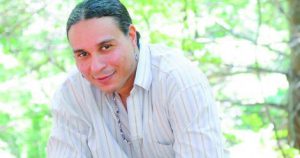A Voice from Deer Island
An interpretation of the actual sufferings and doings of a Christianized, Praying Town Indian from Massachusetts during the King Philip’s War of 1675/1676
Tis another bitterly frigid day, and many more are much sick, feeble and hath succumbed to an undignified passing.
This icy wind snapeth athwart the ocean with merciless frequency, whereby there is no absolve from its freezing lash—- like a cruel masters whip, chipping flesh from thy bone.
These shanty and miserable quarters provided by the magistrate are but a mockery of a fit dwelling and only serve as a port of sorrow.
Deprived and ill favored souls layeth bareley clothed, reaching to and fro, as to seek cover from the few tattered blankets they have in their possessions.
The shivering and clustering of bodies make haste of wanton carriage and sickness that spreadeth about their huts.
I witnessed a frail woman on Thursday, digging about earnestly in the frozen earth. She was in search of clams or any such divers sustenance to feed her three sickly children.
Much of the woman’s hair, which I surmise at one time was of goodlier length and vigorous, but now had fallen out. Her gaunt and chafed countenance, shrouded the great sadness that she expelled- for there was no food to be found. She then cradled her three girls with her bloody and soiled hands, and wept.
Her smallest girl died that evening. By come of dawn, the other two daughters and the mother froze to death.
Yesterday was the first day- since 24 hath past by, that a ship hath arrived with rations. But alas, tis bareley suffice 40 to 50 souls. I feared the scarcity of goods would bring about reproach and malice among my people. On the contrary the men and woman alike did their most admirable to divide what pitiful and meager quantity amongst their kindred. Tis moments as such, when I bring to mind the teachings of my grandmother.
As nightfall drew near, our people showed great jubilation when they spied a Sloop approacheth the island, judging it to be carrying more provisions.
Countless folk made haste to meet the ship by the cold waters. But as they greeted the vessel, they were brained about the head with long sticks and hauled on board. They were taken captive, for they were indeed slave merchants.
We were but the first to be charged here from Natick. We were forced from our homes at musket point. They shackled us about the neck and legs. And thus, ferried to this desolate and barren prison. Now they cometh from Wamasit, Neshoba, Hassanamesit, Punkapaug and diverse other places. At last recollection, 633 have died. And the horrid stench about this place, is as foul to the senses, as it is a revolting burden to bear witness with thine eyes. The endless weeping and dejected moaning, is more harsh to the ear than a score of musket fire.
To fend off thirst, some have taken to drink seawater, which has only hastened their demise. Numerous men have broken wrists and fingers in pursuit to dig graves in frost hardened sand. For we have no tools, as none were provided.
This is a repulsive sight and I am vexed beyond repair.
Even now, as I seek reprieve of solitude from this calamity to compose my account: I am bombarded by mournful bleatings, wretched cries for help and lack of space that is free of the imprecations of great misery.
Where are the ministers and their hearty consolations now I say ? I hearken for any such sermon that could bring aid to this ruin.
They told us they sent us here to protect us from the heathen Indians- non Christians Indians, as it were, who would make war with the English. For we were deemed the Praying Indians: a wholesome lot – dutiful in prayer and service to the Crown.
Despite of our loyalty and unwavering fidelity, an official decree from Boston deemed us untrustworthy. Hence we find ourselves interned in this barren and frozen Keep. A death sentence for our troubles.
I am Keenopahtam. I am 36 winters old. At the age of 12, I was sent to be a house servant and educated in the manner of the English under the care of Goodman Alex at the English village of Lancaster.
I was baptized and for many years learned to read and write and earnestly took heed to the teachings of the gospel under Minster John Elliot. Hence forth I was charged with the duty to preach to my people of Natick. And thus sent back to the Praying town for that cause. Minister Elliot named me Preacher Alex.
With the same letters taught to me by the minister- I now scornfully renounce the name of Preacher Alex. For my mock name or mock title bestowed by the church did not spare me of the same fate of my kin, who now have taken to the path of war, against the Crown.
There is not one Indian on this frigid island who hath raised their fist against the English, but yea we are imprisoned like swine.
On one occasion, the guards transported over decapitated Indian heads and paraded them about the island. They say, this was to provide a stern exhortation not to escape and seek collaboration amongst the warring Indians.
I did not fear looking upon those heads without bodies. For I deemed that death more swift and noble than being the victim of this decaying and feeble end.
Then on that same day- the English captain Thomas Dudley, courted my audience in a design that I may scheme among the warring Indians and reveal their strategy. This entreat, was joined with promise to ease my days.
Lo, I sharply rebuked his request and made clear my desire to sit still. And in my heart I quietly bemoaned that this pen, should be a hatchet, that I may surely cut him off from my brethren.
Mattawamp and the others were right to fight the English. I now lament, I was not among them at Quaboag, fighting for our freedom as men.
For I was thoroughly convinced this book the English call the bible was the way for our people. But I was wrong. I have lived the white man’s lie in life, but shall have the truth of my people in death.
In days of old, my ancestors were of one mind – one people. We traversed our country with ease. We ate good food. Our cornfields were unmolested by English cattle and hogs. High spirits and laughter were as plentiful as leaves on an oak tree in those days. The insatiable lust for beaver, wampum and now land, did not blossom among us who hath been put here first by the Great Spirit.
The harsh travails and division we now endure have been designed by English greed, and the Indians coveting of the white man’s strong drinks. And for my part, I have lingered in their falsehood and friendly comportment to the disadvantage of mine own people.
Now , tis with great difficulty that I find vigor to scribe these words. My vision is fading; my body is frail. My hands feel heavy as stone, cold and turning black.
I only beseech that this parchment live in my stead as testament to the foul contrivance devised by these wicked men. For these words remain as the condemnation of their ignoble deeds laid bare. Bare as the bodies and bones of those dying before mine eyes in this miserable place.
Perhaps, in generations to come – men will admonish such reckless hate and live true -as one mind. But alas, by this warrs conclusion, if there ever is such, I hath scant faith there will be a Red Man left alive to take part in such peace.
For all that we have given and sacrificed did not avail. Nor could it pardon the one sin that the English charged us with. The one we could never undo. That is our birth as an Indian. No amount of prayer or piety could amend that in their hearts. They taught us of such beliefs as a heaven, which they say, is a blissful, peaceful and everlasting place beholding of Gods splendor. Why this glorious place they speak of, does not inspire charity and love amongst them, I have scant knowledge. And they speak of a hell, which they say, is a burning and agonizing endless calamity of misery, torture and death. I understand now, everything they taught me was a lie and I will end my days praying in the ways of my ancestors, and singing the songs of my grandfathers. But as for their hell, I do believe, for it is here, on Deer Island.
Keenopahtam 25th December, 1675 [i]
[i] According to colonial records in the Massachusetts State Archives, the Nipmuc Indian Preacher Alex, also known as Keenopahtam, was unaccounted for during an internee inspection in late January 1676. A search ensued but he was never found. He was presumed dead, or captured by slave merchants. His whereabouts have never been determined. In 1842 a work crew began the labor of building a hospital on Deer Island for European immigrants. As they were digging the foundation they discovered his letter sealed in a clay vase.
 Larry Spotted Crow Mann is a citizen of the Historical Nipmuc Tribe of Massachusetts. He is an internationally acclaimed writer, poet, cultural educator, traditional story teller, tribal drummer /dancer and motivational speaker on issues including youth sobriety, cultural and environmental awareness. His new novel, The Mourning Road to Thanksgiving, was the number one selling novel out of his publishing house for 2014. He travels throughout the United States, Canada and parts of Europe to schools, colleges, pow wows and other organizations sharing the music, culture and history of Nipmuc people.
Larry Spotted Crow Mann is a citizen of the Historical Nipmuc Tribe of Massachusetts. He is an internationally acclaimed writer, poet, cultural educator, traditional story teller, tribal drummer /dancer and motivational speaker on issues including youth sobriety, cultural and environmental awareness. His new novel, The Mourning Road to Thanksgiving, was the number one selling novel out of his publishing house for 2014. He travels throughout the United States, Canada and parts of Europe to schools, colleges, pow wows and other organizations sharing the music, culture and history of Nipmuc people.
